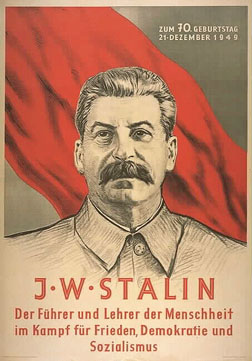50th Death Anniversary of J.V. Stalin

J.V. Stalin: The leader and teacher of mankind in the struggle for Peace, Democracy and Socialism, 1949.
Lev Kotyukov
|
50th Death Anniversary of J.V. Stalin |
 |
|
J.V. Stalin: The leader and teacher of mankind in the struggle for Peace, Democracy and Socialism, 1949. |
In the canonical biography of J.V. Stalin published by the Institute of Marx-Engels-Lenin during his lifetime and, as some maintain, written and edited by him, there is not even half a word about the poetic creativity of the leader.
In their youth many people dream of becoming poets, but running out of wind in their race to be published and attain fame, they reconcile with their failure and in their mature age muse over their homespun doggerel with a smile. Therefore the leader did not consider it necessary to talk about his passion for poetry in his monumental life-story. This is the most apparent conclusion. But it would be a wrong one. Joseph Dzhugashvili, in contrast with the failed artist Adolf Schickelgruber, did not dream just about poetic recognition: he was a poet, was recognized and distinguished as a poet in the very early years of hazy youth. Georgian journals and papers readily gave him space on their pages and his verses were fondly learned by heart. Especially noteworthy is the fact that, not anybody else but the living classic of Georgian literature Iliya Chavchavadze marked Joseph Dzhugashvili out as a ‘young man with burning eyes’ and included his verses in the reading book for schools. Who among the present young and not so young poets can boast of such early recognition?
Then why did the proud ambitious young Dzhugashvili not follow his passion? Why, being born a poet and like Arthur Rimbaud, having attained fame in the very beginning, he goes into the revolution and forgets himself as a poet? Let's try, as much as it is possible, to answer this question.
The end of the XIX Century in Russia was marked by the tumultuous development of capitalism. The 1880-1890 years were indeed very anti-poetic. Forgetting about eternity people were turning Time into Money; with contempt for poetry they were engaging in business. The fact speaks for itself that the brilliant work ‘Evening lights’ of Afanasii Fet, published by the poet from his own pocket, remained practically unsold. It would not be out of place to remember the contemptuous words of Lev Tolstoi that were so popular at the time: ‘Writing poetry is like dancing around a plough’.
The young, much too mature for his years, Joseph Dzhugashvili knew well that a poet’s career promises not only fame, but also humiliation, and he did not want to reconcile with such a fate as, from childhood, remaining under the weight of the secrecy of his background, he knew well what awaits him. He moves away from poetry … moves away in order to struggle against universal oppression. The result of this struggle is known.
What we do not know is whether Joseph Dzhugashvili forgot the poet in himself forever after coming out in the world under the name of Stalin. Poets jealously hide their secrets for eternity. But who knows… But we know that during the Soviet period his verses were never published and, moreover, were never included in any reading book, though, visibly, to do so must have been just so easy.
It is true that in 1949, on the initiative of L.P. Beria, an attempt was made, secretly from Stalin, to publish his verses in Russian as a gift edition on his 70th birth anniversary. For this purpose, under strict secrecy, the best translators were involved including B. Pasternak and A. Tarkovskyi.
Having acquainted themselves with the anonymous verses, not being able to guess the name of the author, one of the master translators exclaimed: ‘this work is worth the Stalin Award of the first order’.
But in the middle of the work on the translation a stern order was received to immediately stop the work. I think, there is no need to guess where the order came from – the poet Joseph Dzhugashvili did not become a laureate of the Stalin Award by the will of Stalin.
The end of the present century (XX century – trans.), as the previous one is renowned by a precipitous decline in interest for poetry among our public educated on Mexican tele-serials. On the minds and the lips of every one there is only money, money and money… and the delusion that the wind blows not through the green leaves of the Russian birch tree but through these satanic ‘greenbacks’, and everywhere – humiliation, humiliation and humiliation… it comes to ones mind with sadness and apprehension that maybe at this very moment a young boy with the Divine gift in his heart, having experienced a thousand humiliations in his search for a so called ‘sponsor’ for the publication of his brilliant book, gazes with a devastated look thorough a dark dead space and crumples a sheet of paper with unfinished verses and reaches out for a new sheet and writes the application for joining a newly formed party of ‘fighters for peoples’ happiness and justice’.
And the young boy is sad at heart, and grief be upon the people, when true poets and prophets turn to revolution and politics, and the run of the mill politicians and presidents vainly yearn for the recognition fit only for prophets and artists.
The poetic interest of Joseph Dzhugashvili lasted only four years, from 1893 to 1896. The manuscripts of his verses have been irrevocably lost and the search for those published during his lifetime is very limited due to well- known reasons. At present we are publishing some of his verses that have been unjustifiably forgotten by us and the poet himself.
‘Zavtra’ No. 41 (46), 1994
Translated from the Russian by Tahir Asghar
Click here to return to the April 2003 index.